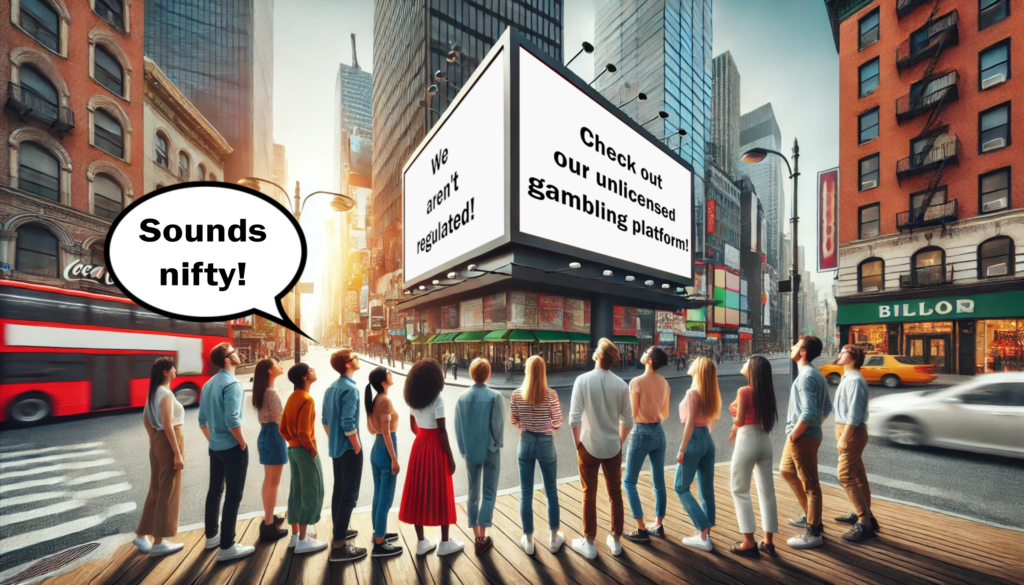After attending the Global Gaming Expo in Las Vegas last month, there was one question that stood out regarding the North American gambling industry – “how will regulators deal with sweepstakes casinos (“Sweeps Casinos”)?” Depending on who you ask or which jurisdiction you live in, opinions vary on whether Sweeps Casinos are legitimate sweepstakes promotions or, are illegal, unlicensed lottery schemes (“Unlicensed Operators”) that are being disguised as sweepstakes businesses. A handful of states in the USA have already deemed Sweeps Casinos to be Unlicensed Operators (for example, in Washington,1 Michigan,2 and Connecticut3). So, if Sweeps Casinos are deemed to be Unlicensed Operators federally or on a state-by-state (or province-by-province) basis, how will the USA and Canada deal with Unlicensed Operators’ advertising activities?
The U.S.A.
The Department of Justice previously dealt with a similar issue in the early 2000s regarding the advertising activities of offshore gambling operators. In 2003, the Department of Justice (“DOJ”) sent a letter to the National Association of Broadcasters (“NAB”) to warn about the consequences for broadcasters that engage in such activities.4 The DOJ noted that broadcasters that accept funds to advertise for such offshore, Unlicensed Operators may be aiding and abetting illegal activities (specifically the Wire Act, Illegal Gambling Business Act, and the Travel Act).5
As a result, news outlets such as Microsoft, Google, Yahoo,6 and the Sporting News7 all entered into settlements with the federal government related to their roles in disseminating advertisements for illegal, offshore Operators (in 2006 and 2007, respectively).
Nowadays, social media websites (including search engines) typically require proof of a license (or a legal opinion that the activities are legal) and the targeted territory that the advertiser wants to reach. In practice, we’ve seen Sweeps Casinos in the market use “hub licenses”8 to unlock their ability to advertise to their target jurisdiction even if they don’t have a license from their target jurisdiction. We previously wrote a series of articles about how different social media sites approach gambling advertisements, which you can visit HERE, HERE, and HERE.
Given the DOJ’s letter to the NAB related to Unlicensed Operators in the early 2000s and its subsequent settlements with Microsoft, Google, and Yahoo, it’s possible the DOJ could take a similar approach this time around with advertisers and Sweeps Casinos. As a result, social media companies, search engines, and broadcasters should be cautious in allowing Sweeps Casino content to be viewed on their platforms, particularly in States where those activities have been deemed illegal.
Canada
In Canada, you don’t have to look quite as far in the past to see some of the issues arising from advertising Unlicensed Operators from other jurisdictions. Just over two years ago, when Bill C-218 received royal assent to allow provinces to conduct and manage their own lottery schemes, Ontario was the first to introduce its regulated igaming market. What resulted in those first few months after April 2022 was a rush from registered Ontario operators (“Ontario Operators”) to flood consumers’ televisions, social media channels, and billboards with advertisements that were as flashy and pervasive as possible.
However, at that time, the advertisements which were meant to target Ontario customers began seeping into other provinces. As a result, Alberta’s regulator, Alberta Gaming Liquor and Cannabis ( “AGLC”), took the position that such advertisements were illegal, as those sites were not permitted to operate in Alberta.9
The AGLC was not wrong in this case. The Criminal Code of Canada10 makes it an offence, subject to certain exceptions (such as being legally operated by the provinces),11 to:
advertise any scheme for disposing of property by any mode of chance,12 and
provide information intended for use in connection with book-making, or betting on any horse race, fight, game, or sport, whether or not it takes place in Canada.13
Unfortunately for provincial gaming corporations, to our knowledge, there have not been any penalties to Ontario Operators for advertisements that have reached other provinces. Ad Standards Canada reported 113 complaints related to gambling advertisements between April 29, 2023, and April 24, 2024.14 However, it’s unlikely any significant fines or penalties have been imposed as Ad Standards Canada aims to resolve disputes with advertisers prior to reaching such a stage.
As of April 2024, Ontario-based gambling ads were still being seen across Canada.15 The British Columbia Lottery Corporation’s Chief Compliance Officer, Marie-Noëlle Savoie, said that broadcasters have the ability to geofence such ads so they only appear in Ontario, but they haven’t done so. The Canadian Radio-Television and Telecommunications Commission (“CRTC”) has not taken a position on the issue and instead encouraged concerned stakeholders to follow the developments of the proposed Bill S-269, which seeks to set a national framework for sports betting ads.16
So, even though Ontario Operators’ advertisements may be considered as Unlicensed Operators in provinces other than Ontario, there appears to be limited recourse for how authorities have enforced and penalized their advertising activities. When comparing the USA to Canada, it’s clear the USA’s broader depth of precedent and increased willingness to enforce its laws against Unlicensed Operators’ advertising activities should make Sweeps Casinos cognizant of which jurisdictions are cracking down in the USA. While Canada has not caught up quite yet in terms of enforcing its laws against Unlicensed Operators, Bill S-269 may bring Canada closer to the USA, but only time will tell.
At GME Law, we are following the developments of the sweepstakes environment in the USA (and Canada) and Bill S-269 closely, so please don’t hesitate to reach out if you have any questions.
1 See for example Larsen v. PTT, LLC, Case No. 3:18-CV-05275.
2 Michigan Gaming Control Board, Michigan Gaming Control Board sends cease-and-desist letters to US, international internet gaming companies due to illegal operations, January 18, 2024.
3 Zak Thomas-Akoo, Next.io, Sweepstakes operator VGW exits Connecticut after cease-and-desist, NEXT.io, October 2, 2024.
4 Letter from Office of the Deputy Assistant Attorney General to National Association of Broadcasters, re: Advertising for Internet Gambling and Offshore Sportsbooks Operations, June 11, 2003.
5 The Wire Act, 18 U.S.C. § 1084; Illegal Gambling Business Act, 18 U.S.C. § 1955; Travel Act, 18 U.S.C. § 1952.
6 Microsoft, Google, Yahoo to Pay $31.5M Over Illegal Gambling Ads, ABC News, December 19, 2007.
7 Matt Richtel, Sporting News Settles Case on Gambling Ads, the New York Times, January 21, 2006.
8 Hub licenses are licenses that allow casinos to operate from a particular jurisdiction, even if they are not operating in that jurisdiction, such as Curacao or Isle of Man.
10 R.S.C., 1985 c. C-46. [hereinafter the “Code”].
11 Ibid at Section 207.
12 Supra Note 10 at Section 206(1)(a).
13 Supra Note 10 at Section 202(1).
14 Advertising Standards Canada, 2024 – Gaming Advertising Complaints.
15 Kelly Provost, Ontario-based sports betting ads continue to be shown on Tvs across Canada. For now, it’s the networks’ call, CBC News, April 22, 2024.
16 Ibid.




